|
|
|
Sort Order |
|
|
|
Items / Page
|
|
|
|
|
|
|
| Srl | Item |
| 1 |
ID:
174761
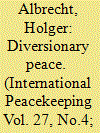

|
|
|
|
|
| Summary/Abstract |
What is the impact of international peacekeeping missions for civil-military relations at home? This article unpacks the conditions that produce positive effects of peacekeeping participation on the domestic politics of an authoritarian regime. Drawing on field research, I discuss four mechanisms that link foreign policy making to domestic civil-military relations in Ben Ali’s Tunisia. First, the deployment of troops for peacekeeping abroad presents obstacles for the coordination of coup plots at home. Second, incumbents can allocate material resources to meet officers’ economic grievances. Moreover, peacekeeping operations serve to enhance corporate institutionalization through specific training programmes. Finally, peacekeeping contributes to a professional ethos and hence the depoliticization of the officer corps. These findings give rise to the notion that contributing to peace can have similar effects for domestic politics as going to war.
|
|
|
|
|
|
|
|
|
|
|
|
|
|
|
|
| 2 |
ID:
145076
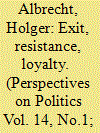

|
|
|
|
|
| Summary/Abstract |
A few years into the most recent wave of popular uprisings—the Arab Spring—studying regime trajectories in countries such as Syria, Egypt, and Yemen still seems like shooting at a moving target. Yet what has not escaped notice is the central role military actors have played during these uprisings. We describe how soldiers have three options when ordered to suppress mass unrest. They may exit the regime by remaining in the barracks or going into exile, resist by fighting for the challenger or initiating a coup d’état, or remain loyal and use force to defend the regime. We argue that existing accounts of civil-military relations are ill equipped to explain the diverse patterns in exit, resistance, and loyalty during unrest because they often ignore the effects of military hierarchy. Disaggregating the military and parsing the interests and constraints of different agents in that apparatus is crucial for explaining military cohesion during such crises. Drawing on extensive fieldwork we apply our principal-agent framework to explain varying degrees and types of military cohesion in three Arab Spring cases: Bahrain, Yemen, and Syria. Studying military hierarchy elucidates decision-making within authoritarian regimes amid mass mobilization and allows us to better explain regime re-stabilization, civil war onset, or swift regime change in the wake of domestic unrest.
|
|
|
|
|
|
|
|
|
|
|
|
|
|
|
|
| 3 |
ID:
160234
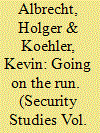

|
|
|
|
|
| Summary/Abstract |
Under which circumstances do soldiers and officers desert in a violent domestic conflict? This article studies individual military insubordination in the Syrian civil war, drawing on interviews with deserters from the Syrian army now based in Turkey, Jordan, and Lebanon. A plausibility probe of existing explanations reveals that desertion opportunities originating in conflict events and the presence of safe-havens fail to explain individual deserters' decision making. Accounting for socio-psychological factors—moral grievances and fear—generates more promising results for an inquiry into the conditions under which military personnel desert. While moral concerns with continued military service contribute to accumulating grievances among military members engaged in the civil war, fear—that is, soldiers' concerns for their own safety—is a more effective triggering cause of desertion. The article presents a theory-generating case study on the causes of military insubordination and disintegration during violent conflict.
|
|
|
|
|
|
|
|
|
|
|
|
|
|
|
|
| 4 |
ID:
160571
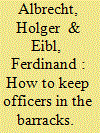

|
|
|
|
|
| Summary/Abstract |
What are the most efficient strategies to prevent military coups d’état? The answer depends on coup agency, that is, who attempts to overthrow the regime: elite officers or lower-ranking combat officers. Elite officers and lower-ranking combat officers have different incentives, opportunities, and capacities when it comes to perpetrating coups. Using original data on coup agency, public spending, and officer salaries in the Middle East and North Africa, we find that counterbalancing—a strategy designed to increase barriers for coup plotters’ coordination efforts—and higher shares of defense spending prove more effective at preventing coups by elite officers. However, higher social spending reduces the risk of coups by combat officers. Political liberalization has mixed effects on military agents. It decreases the risk of coups by combat officers, but makes elite officers more likely to mount coups. Our findings suggest that the study of coups needs to better incorporate variation and that we need to rethink the image of coups as purely elite-led power grabs.
|
|
|
|
|
|
|
|
|
|
|
|
|
|
|
|
| 5 |
ID:
167958
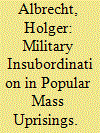

|
|
|
|
|
| Summary/Abstract |
HOLGER ALBRECHT explores the effects of popular mass uprisings on civil-military relations in authoritarian regimes. Drawing on cases from the Arab Spring, he examines different types of military insubordination and the conditions catalyzing military coups, mutinies, officer defections, and mass desertions.
|
|
|
|
|
|
|
|
|
|
|
|
|
|
|
|
| 6 |
ID:
141168
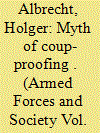

|
|
|
|
|
| Summary/Abstract |
This article argues that coup-proofing does not necessarily reduce the general propensity among military officers to stage coups d’état against authoritarian incumbents. Sophisticated coup-proofing terminates coup cascades and buys incumbent rulers time in office, but general coup risk remains high even if they maintain power for long periods of time. The article uses a new data set on coups in the Middle East and North Africa covering the period 1950–2013. The data reveal that the number of coup instances has decreased over time, but the risk for incumbents of falling to a coup during their extended time in office remains constant, even in coup-proofed autocracies. When autocrats apply coup-proofing measures, timing and agency become increasingly important. Plotters attempt coups either immediately after power turnovers or when incumbents turn into lame ducks after excessively long periods of rule. Success rates increase when coup plotters are supported by central military leaderships.
|
|
|
|
|
|
|
|
|
|
|
|
|
|
|
|
| 7 |
ID:
177007
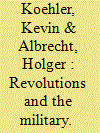

|
|
|
|
|
| Summary/Abstract |
This article presents a systematic analysis of military coups following popular mass uprisings in nondemocratic regimes, conceptualized as endgame coups. Drawing on our original, medium-n data set of revolutionary situations, we find that such endgame coups form a distinct type of military intervention in politics. Compared to regular coups, episodes of popular mass contestation prompt conservative interventions in politics of the military’s leadership aimed at preserving the regime’s authoritarian infrastructure. A systematic test of factors characterizing postcoup political trajectories is based on Cox proportional hazard models and provides empirical evidence in contrast to the widely held notion of “democratic coups.” Our findings reveal that endgame coups are conservative rollback coups, executed by military leaderships, that result in continued political instability and illiberal politics.
|
|
|
|
|
|
|
|
|
|
|
|
|
|
|
|
| 8 |
ID:
188709
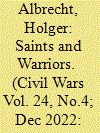

|
|
|
|
|
| Summary/Abstract |
This article explores how rebel groups come into being and how they sustain their activities. Its core premise is that the strategies used in rebel recruitment are crucial for such organisations. Knowing how rebel groups attract members will tell us why they are strong and, by extension, who is getting the upper hand in violent domestic conflicts. Drawing on empirical findings from the Syrian civil war, the article unpacks strategic choices in rebel recruitment: successful rebel groups benefit from the recruitment of combat-ready fighters (warriors) at the time of their inception and of high-commitment rebels (saints) amid sustained insurgent activities.
|
|
|
|
|
|
|
|
|
|
|
|
|
|
|
|
|
|
|
|
|